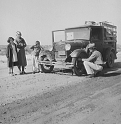

| The Library of Congress | |
 |
 |
 |
Figuring Somepin 'Bout the Great Depression
Amy McElroy and Chris Pietsch |
| Objectives |
Students will:
|
| Time Required | 7-10 class days, about half in the computer lab, and half in a regular classroom setting; time out of class to complete the scrapbook. |
| Recommended Grade Level | 10 – 11 (may be adapted for other grades learning about the Great Depression) |
| Curriculum Fit | Ideal for a team-taught American Studies course, but may
adapted to a history or English class on the Great Depression in general, or more specifically on The Grapes of Wrath and the Great Depression. |
| Standards | McREL 4th Edition Standards & Benchmarks Historical Understanding Language Arts US History |
| Resources |
American Memory Other Electronic and Print Resources
|
| Materials |
How to Analyze a News Article |
|
Lesson One: Analyzing a Photograph (1-2 class periods) Using FSA/OWI Photographs, 1935-1945, students search, select, and analyze a photograph of a migrant farm worker. |
|
Lesson Two: Gathering Voices (3 class periods) Using the novel The Grapes of Wrath and Voices from the Dust Bowl, 1940-1941, students collect migrants' quotations, illustrating different aspects of their colloquial language. |
|
Lesson Three: Analyzing Issues (2 class periods) Students interpret articles and editorials from newspapers to gain understanding of political issues of the Great Depression relevant to migrant farm workers. |
|
Lesson Four: Putting It All Together (2 class periods) Students compile a scrapbook of photographs, quotations, and notes, representing the perspective of a migrant farm worker selected in Lesson One. |
|
Evaluation
Students' scrapbooks must contain examples of the colloquial speech of Depression-era migrant farm workers and evidence of the issues which they faced. See the Scrapbook Evaluation Rubric. Extension
|
| The Library of Congress | American Memory | Contact us |
| Last updated 09/26/2002 |